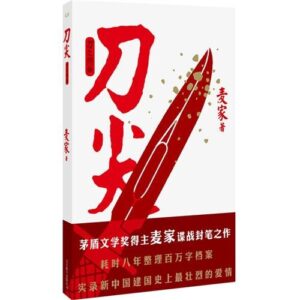Seven Killings
刀尖
China, 2023, colour, 2.35:1, 120 mins.
Director: Gao Qunshu 高群书.
Rating: 7/10.
Low-key but absorbing WW2 spy thriller set in Japanese-occupied Nanjing, with a strong cast and a script full of shadowplay and deception.
Nanjing city, eastern China, Dec 1940. Following the retreat of the Nationalist (KMT) government under Jiang Jieshi [Chiang Kai-shek] to Chongqing, the Japanese have installed the puppet Reorganised National Government of the Republic of China, under Wang Jingwei, formerly a member of the KMT’s Chongqing government. The city is full of competing but inter-dependant factions – pro-Japanese, anti-Japanese, and all shades between. When KMT cryptographer Bai Dayi is captured by the Japanese, the Chongqing government sends a team of agents, led by one known as Zhonghua Gate (Zhang Li), to kill Bai Dayi as he holds top-secret codes in his head. The mission fails and all die. The local supervisor of the mission, Jin Shenshui, aka Rainflower (Zhang Yi), who officially works in the Nanjing government’s counter-espionage bureau headed by Lu Jingyu (Huang Zhizhong), is instructed by Ge Zheng (Cheng Taishen), head of the Chongqing government’s Nanjing branch, to lead another mission to eliminate Bai Dayi. At the regular weekend dance at the Japanese army’s East China Club he makes contact with a new agent sent by Chongqing secret-police head Dai Li: she is Lin Yingying (Lang Yueting), aka Mochou Lake, who has officially come to join the Nanjing counter-espionage bureau as its secretary. She says she can have Bai Dayi killed in three days’ time if Jin Shenshui tells her which prison cell the Japanese army is holding him. Bai Dayi is shot dead by a sniper as he hands Jin Shenshui some codes during their regular twice-weekly meeting in the gardens of the Japanese army’s headquarters. During the security bureau’s subsequent investigation led by Japanese officer Fujiwara Takeshi (Kimura Kazuya) and Chinese officers Li Shiwu (Sha Yi) and Yu Zhiren (Gao Jie), the soldier Zhou Dashan (Ren Hailong) is arrested by Li Shiwu and confesses under torture. However, Fujiwara Takeshi discovers the man is just a deserter, not the assassin, and accuses Li Shiwu of being a traitor. On Fujiwara Takeshi’s orders, Li Shiwu is immediately hanged. Though they all profess to be friends, all the Chinese in the Nanjing puppet government are playing multiple games: on one side are Lu Jingyu, Jin Shenshui and Lin Yingying in the counter-espionage bureau, on the other are security bureau deputy head Yu Zhiren (also head of special operations at the police bureau), security bureau officer Qin Shiguang (Jin Shijia) and counter-espionage bureau assistant director Ma Ren (Li Chun). After trying to romance Lin Yingying, and then finding she’s secretly pregnant, Qin Shiguang realises she’s a Chongqing spy, lures her into a trap, and almost succeeds in killing her. She manages to escape but her husband Gao Kuan (Yang Yi) ends up dead. After Lin Yingying manages to alert Jin Shenshui, the latter shoots Qin Shiguang dead. But Jin Shenshui then realises that Lin Yingying is part of a much bigger operation, and reports to her elder brother Yang Fengmao (Nie Yuan), aka Feng Erhu, who’s officially head of Nanjing’s chamber of commerce but also leads an anti-Japanese Communist group in the city. Some time later, when news arrives that the Chongqing government has started collaborating with the Japanese to eliminate anti-Japanese forces and the Communist party, Yang Fengmao launches Operation Spring Thunder, to destroy a Japanese bacteriological institute that’s developing a brain-destroying drug to put in Chinese children’s sweets. Though not a member of the Communist party, Jin Shenshui joins Lin Yingying out of personal loyalty.
REVIEW
 There’s a sight more than seven killings in Seven Killings 刀尖, a curiously titled but otherwise absorbing spy thriller, set in Japanese-occupied Nanjing in 1940, that has an exceedingly high mortality rate among its cast. The film’s Chinese title means “knife edge” or “knife point”, accurately describing the amosphere of perpetual duplicity and fear of betrayal that drives the narrative, as various anti-Japanese agents jostle around in the suspicion-infested city. Based on a 2011 novel (see cover, left) by Mainland writer Mai Jia 麦家 that was already made into an online drama series (Nose of Tool 刀尖, 2017, dir. Sun Wenxue 孙文学, see poster, below left), Seven Killings was shot in early 2018 but only released in late 2023, to poor box office (RMB51.7 million).
There’s a sight more than seven killings in Seven Killings 刀尖, a curiously titled but otherwise absorbing spy thriller, set in Japanese-occupied Nanjing in 1940, that has an exceedingly high mortality rate among its cast. The film’s Chinese title means “knife edge” or “knife point”, accurately describing the amosphere of perpetual duplicity and fear of betrayal that drives the narrative, as various anti-Japanese agents jostle around in the suspicion-infested city. Based on a 2011 novel (see cover, left) by Mainland writer Mai Jia 麦家 that was already made into an online drama series (Nose of Tool 刀尖, 2017, dir. Sun Wenxue 孙文学, see poster, below left), Seven Killings was shot in early 2018 but only released in late 2023, to poor box office (RMB51.7 million).
 It’s the second stab at a Mai novel by Hebei-born director Gao Qunshu 高群书, now 57, who co-directed, with Taiwan’s Chen Guofu 陈国富, the immensely entertaining The Message 风声 (2009), a kind of spy whodunit also set in 1940s China that tipped its hat to other crime writers like Agatha Christie. Gao, who’d previously directed Tokyo Trial 东京审判 (2006) and crime drama Old Fish 千钧。一发 (2008), was then at the height of his powers, going on to make the Chinese “eastern” Wind Blast 西风烈 (2010), docu-drama-like police drama Beijing Blues 神探亨特张 (2012), wannabe noir Crimes of Passion 一场风花雪月的事 (2013) and family drama The New Year’s Eve of Old Lee 过年好 (2016). His film career gradually lost traction during the 2010s, largely due to poor scripts, and he ended up doing more and more TV. He also has the police detective drama Three Old Boys 三叉戟, shot in late 2019/early 2020 with a heavyweight cast including favourites Huang Zhizhong 黄志忠, Jiang Wu 姜武 and Guo Tao 郭涛, still sitting on the shelf.
It’s the second stab at a Mai novel by Hebei-born director Gao Qunshu 高群书, now 57, who co-directed, with Taiwan’s Chen Guofu 陈国富, the immensely entertaining The Message 风声 (2009), a kind of spy whodunit also set in 1940s China that tipped its hat to other crime writers like Agatha Christie. Gao, who’d previously directed Tokyo Trial 东京审判 (2006) and crime drama Old Fish 千钧。一发 (2008), was then at the height of his powers, going on to make the Chinese “eastern” Wind Blast 西风烈 (2010), docu-drama-like police drama Beijing Blues 神探亨特张 (2012), wannabe noir Crimes of Passion 一场风花雪月的事 (2013) and family drama The New Year’s Eve of Old Lee 过年好 (2016). His film career gradually lost traction during the 2010s, largely due to poor scripts, and he ended up doing more and more TV. He also has the police detective drama Three Old Boys 三叉戟, shot in late 2019/early 2020 with a heavyweight cast including favourites Huang Zhizhong 黄志忠, Jiang Wu 姜武 and Guo Tao 郭涛, still sitting on the shelf.
Gao is at his best in tough, well-scripted crime dramas, and in Killings he is content to rely on a screenplay that gently simmers rather than jumps from one action setpiece to another, as well as a strong cast that holds the attention. These two factors just manage to push the film to a 7/10. The film’s weakness – which may explain its disappointing box office – is that it doesn’t have a strong enough signature to distinguish it from so many WW2 spy dramas that fill the TV schedules, and asks its audience to wait over an hour before its first extended action sequence.
The Message was successful because it was deliberately theatrical and o.t.t., as well as ploughing fresh ground in the genre. But it could only be a one-off. Killings looks great, with deep burnished colours in interiors and nicely composed scenes in exteriors, but there’s no special noir-ish feel to the widescreen photography by Liu Yin 刘寅 (My Old Classmate 同桌的妳, 2014; The Insanity 你好,疯子!, 2016; The Wandering Earth 流浪地球, 2019). Again, Gao seems wary of going too far over the top, preferring to let the actors and script speak for themselves. But it’s not an approach that necessarily brings box-office rewards.
The film’s first half is undoubtedly its strongest, with all the multiple deceptions and spycraft. The second half, driven by the novel’s main subject of the team destroying a Japanese bio-lab, is less textured and more political, with Zhang’s character, though not a member of the Communist party (and at one point very critical of its modus operandi), working on the side of its operatives.
At the time of shooting (Jan-May 2018) the film was a big step-up for Harbin-born actor Zhang Yi 张译, then onf the cusp of 40, who had been steadily building a reputation as a supporting actor (Dearest 亲爱的, 2014) and co-lead (Cock and Bull 追凶者也, 2016; Blood of Youth 少年, 2016; Brotherhood of Blades II: The Infernal Battlefield 绣春刀II 修罗战场, 2017) but was only just taking on top-billed roles (the squad leader in Operation Red Sea 红海行动, 2018). Zhang, whose hooded eyes and baleful looks can be used equally in drama or comedy, quietly carries Killings in an understated way, all blank stares that deliberately reveal nothing and attentive eyes under lowered hat brims. As the Chongqing KMT government agent who’s clandestinely working against the Japanese, he’s nicely matched by concert pianist-turned-actress Lang Yueting 郎月婷, then in her early 30s, as a new agent who joins the Nanjing team. Finally in a decent role again, after her revelation in Mountain Cry 喊•山 (2015), Lang has the only substantial female role in the movie but brings it off with confidence, especially in a nicely-written scene in which she’s suspected of murdering a Japanese sympathiser.
In a non-romantic pairing Lang and Zhang establish a low-key but effective chemistry. Among the strong supporting cast, Huang Zhizhong is sikly smooth as the boss of Zhang’s character, Taiwan veteran Gao Jie 高捷 [Jack Kao] has fun with his two-timing role, and Li Chun 李淳 [Mason Lee], son of director Li An 李安 [Ang Lee], ditto as a counter-espionage officer with a liking for torture. In fact, it’s in the basement torture scenes, graphically portrayed, that Killings comes closest to The Message. Among the handful of Japanese actors, all cartoonishly depicted, actress Nakamaru Shion 中丸紫苑 – who has since died, in Jul 2022, aged only 38, after a long illness – stands out as a sympathetic, graceful figure. Her role, as well as several others, appears to have been edited down during post-production; in several respects the two-hour film would have benefited from at least 20 more minutes of footage.
CREDITS
Presented by Beijing Bona Film Group (CN), Rockview Film Entertainment (Beijing) (CN), Beijing JQ Media (CN), Zhijiang Film Group (CN), Zhejiang Bona Film & TV Production (CN). Produced by Horgos Rockview Film Entertainment (CN), CPC Heilongjiang Provincial Committee Publicity Department (CN).
Script: Duo Jie, Mou Xiaoya, Guo Junli. Novel: Mai Jia. Photography: Liu Yin. Editing: Sun Xiao. Editing advice: Zhang Yibo. Music: Shin Jae-yeon, Bak Hyeon-u. Music supervision: Wang Shilin. Art direction: Yang Haoyu, Li Jieyu. Costumes: Zhu Yanyan. Styling: Xu Jianshu [Lawrence Xu], Wei Yujing. Sound: Wang Danning, Liu Linzong. Action: Zhang Tailong.
Cast: Zhang Yi (Jin Shenshui), Huang Zhizhong (Lu Jingyu), Lang Yueting (Lin Yingying/Feng Diandian), Cheng Taishen (Ge Zheng), Sha Yi (Li Shiwu), Gao Jie [Jack Kao] (Yu Zhiren), Jin Shijia (Qin Shiguang), Li Chun [Mason Lee] (Ma Ren), Xu Li (Cheng Xiaolu), Su Xin (Niu), Si Ligeng (Qin Huaihe), Zeng Mengxue (Ge Ling, Ge Zheng’s daughter), Kimura Kazuya (Fujiwara Takeshi), Nakamaru Shion (Shizuko), Nie Yuan (Yang Fengmao), Huang Lu (Liu Xiaoying), Zhang Li (Zhonghua Gate), Cao Weiyu (Chen Yao), Zhang Heng (Auntie Guo), Wang Yi’nan (Du’s wife), Zhao Yali (Chunxiang Hall lady boss), Yang Yi (Gao Kuan, Lin Yingying’s husband), Li Yusheng (Li Zhaohua), Chen Yusi (Wang Xiaoqin), Liu Xiaohai (university professor), Li Zidong (counter-espionage bureau assistant), Ren Hailong (Zhou Dashan).
Release: China, 24 Nov 2023.
